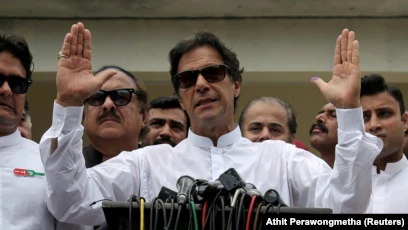
Pakistan’s politics has always been in doldrums but Prime Minister Imran Khan’s actions over the last few weeks have lowered the prestige of the office of the Prime Minister.
In a recent statement the Human Rights Commission of Pakistan (HRCP) expressed deep regret at “the situation that has developed in the wake of the no-confidence motion moved by the opposition parties against the Prime Minister. It is regrettable that a process that is well within the ambit of the Constitution—and clearly defined in it—has been made controversial and the basis for greater political polarisation in an attempt to trigger a constitutional crisis in the country.
The HRCP “firmly believes in constitutionalism and the primacy of the Parliament in undertaking processes within their domain. Measures to obstruct parliamentary functions and the smooth conclusion of a constitutional process are no less than attempts to derail the democratic process and deny people the benefit of their right to representative government. Both the government and the opposition are obliged to adhere to the rule of law defined by the Constitution. Neither taking matters to be settled in Parliament to the streets, nor seeking the intervention of other institutions to determine the fate of a process that is within the parliamentary domain can be in the public interest. It is certainly no way of showing the respect that the institution of Parliament merits in a democratic dispensation. A show of disdain for parliamentary action permitted by the Constitution itself would be a measure for assessing any chief executive’s commitment to democratic rule.
As HRCP noted, “The consequence of defection of a member of the ruling party in the National Assembly is clearly spelt out in Article 63-A of the Constitution. Yet the government has sought interpretation of this constitutional clause in a reference submitted in the Supreme Court. In consonance with the position on the issue taken by most legal experts, HRCP believes that the legislature’s intention in adding Article 63-A was to provide a specific consequence of defection—the loss of that parliamentarian’s seat, not disqualification for life or indeed any other consequence that might jeopardise respect for the constitution, the supremacy of parliament and the fundamental rights of parliamentarians as elected members of the House. Any attempt to read more into the consequence of defection in the context of Article 63-A would be no less than rewriting the constitutional provision. HRCP acknowledges and fully respects the mandate and authority of the Supreme Court to interpret constitutional provisions. It is also confident that the Court is able to discern an attempt by anyone to abuse the process of the Court and will effectively defeat any move intended to involve the Court in political controversies designed to obstruct a constitutional process.
Finally, as HRCP pointed out, “Civil society remains indispensable to the democratic dispensation. It cannot be a silent spectator of events that could result in regressive long-term constitutional effects. HRCP is, therefore, under an obligation to draw public attention to the apprehensions foretold by the emerging crisis that threatens democracy, the rule of law and a peaceful political environment in the country, even if the success of the no-confidence move is dependent on the defection of people from the ruling party.
![]()





